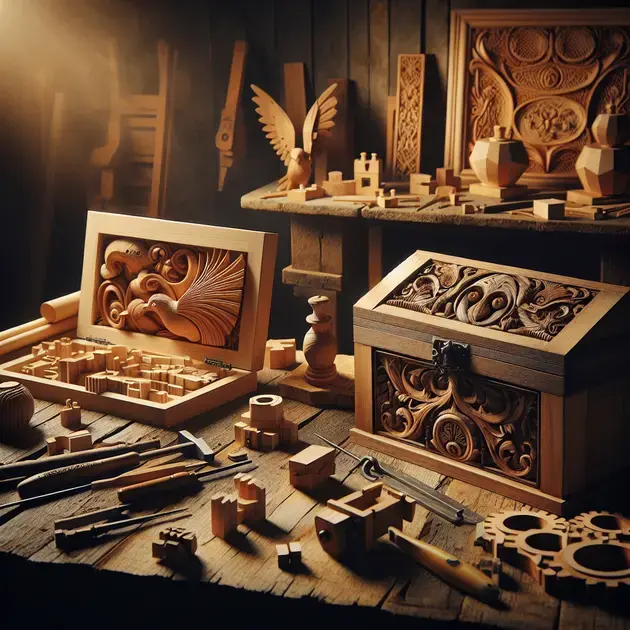When it comes to mastering the art of woodworking, having the right tips and techniques can make all the difference in the world. Whether you’re a seasoned woodworker or just starting out, honing your skills and learning new methods is essential for creating quality projects.
With the rise of online woodworking communities and resources, there’s never been a better time to delve into this craft. By exploring a variety of woodworking tips and techniques, you can expand your knowledge, improve your projects, and take your woodworking skills to the next level.

Essential Woodworking Tips for Beginners
Woodworking can be a rewarding and fulfilling hobby, but it can also be daunting for beginners. Here are some essential tips to help you get started:
1. Start with the Right Tools
One of the first things you’ll need to do is make sure you have the right tools for the job. Websites like Wood Magazine offer detailed guides on essential woodworking tools for beginners.
2. Learn Proper Safety Techniques
Prioritize safety when working with woodworking tools. Websites such as The Spruce Crafts provide comprehensive safety tips for beginners.
3. Practice Basic Techniques
Start by practicing basic woodworking techniques like measuring, cutting, and sanding. Online platforms like Instructables offer free classes for beginners.
4. Choose the Right Wood
Understanding different types of wood is crucial. Websites like The Wood Database provide detailed information on wood species, helping beginners choose the right wood for their projects.
5. Seek Inspiration and Guidance
Don’t be afraid to seek inspiration from experienced woodworkers. Platforms like Reddit’s Woodworking community are great for getting advice and sharing projects.
Advanced Techniques for Mastering Woodworking
Once you’ve mastered the basics, you may want to take your woodworking skills to the next level with advanced techniques:
1. Learn Joinery Techniques
Mastering joinery techniques like dovetail joints and mortise and tenon joints can elevate your woodworking projects. Websites like Fine Woodworking offer in-depth tutorials on advanced joinery.
2. Experiment with Different Finishes
Experimenting with different wood finishes can enhance the overall look of your projects. Websites such as Woodworker’s Source provide guides on various finishing techniques.
3. Incorporate Inlays and Marquetry
Incorporating intricate inlays and marquetry can add a unique touch to your woodworking projects. Platforms like Woodworkers Institute offer tutorials on advanced inlay techniques.
4. Master the Art of Wood Carving
Wood carving is a fine art that requires patience and skill. Websites like Wood Carving Academy provide online courses for mastering wood carving techniques.
5. Explore Advanced Project Designs
Challenge yourself with complex project designs that push your skills to new heights. Websites like Popular Woodworking offer plans and tutorials for advanced woodworking projects.
Enhancing Your Projects with Expert Woodworking Advice
To further enhance your woodworking projects, consider seeking expert advice and guidance:
1. Attend Woodworking Workshops
Attending woodworking workshops and classes can provide valuable insights and hands-on experience. Websites like Woodcraft offer workshops led by experienced woodworkers.
2. Join Woodworking Communities
Joining woodworking communities both online and offline can connect you with like-minded individuals and experts in the field. Platforms like LumberJocks offer a space for woodworking enthusiasts to share knowledge and advice.
3. Invest in Quality Tools
Quality woodworking tools can make a significant difference in the outcome of your projects. Websites like Rockler provide high-quality woodworking tools and equipment for all skill levels.
4. Take on Mentorship Opportunities
Seeking mentorship from experienced woodworkers can provide personalized guidance and feedback. Websites like Woodworkers Guild of America offer mentorship programs for aspiring woodworkers.
5. Embrace Continuous Learning
Woodworking is a craft that requires continuous learning and improvement. Platforms like The Wood Whisperer offer online courses and resources for woodworkers looking to expand their knowledge.

Essential Tools Every Woodworker Should Have
When it comes to woodworking, having the right tools can make all the difference in the quality of your projects. Here are some essential tools that every woodworker should have in their workshop:
1. Circular Saw
A circular saw is a versatile tool that can be used for a variety of cutting tasks in woodworking. Whether you need to make straight cuts, bevel cuts, or rip cuts, a circular saw is a must-have tool for any woodworker.
2. Chisels
Chisels are essential for woodworking tasks that require precision and fine detail. They can be used for shaping, carving, and smoothing wood surfaces. A set of chisels in different sizes and shapes is essential for any woodworking project.
3. Clamps
Clamps are crucial for holding pieces of wood together securely while glue dries or while working on intricate joinery. Having a variety of clamps in different sizes and types can help ensure that your projects are held together firmly and accurately.
4. Level
A level is essential for ensuring that your woodworking projects are straight and level. Whether you’re building furniture, installing shelves, or hanging cabinets, a level can help you achieve precise and professional results.
5. Wood Router
A wood router is a versatile tool that can be used for a variety of tasks, including shaping edges, hollowing out areas, and creating intricate designs. With the right bits, a wood router can add detail and flair to your woodworking projects.
Effective Ways to Improve Your Woodworking Skills
Improving your woodworking skills is a continuous process that requires practice, patience, and dedication. Here are some effective ways to enhance your woodworking skills:
1. Take Woodworking Classes
Attending woodworking classes or workshops can provide valuable hands-on experience and instruction from skilled professionals. Learning new techniques and tips from experienced woodworkers can help you improve your skills and expand your knowledge.
2. Practice Basic Techniques
Mastering basic woodworking techniques, such as measuring, cutting, and sanding, is essential for building a strong foundation of skills. Practice these fundamental techniques regularly to improve your accuracy and efficiency in woodworking projects.
3. Experiment with Different Woods
Working with a variety of wood species can help you understand their unique characteristics and how they respond to different tools and finishes. Experimenting with different woods can broaden your woodworking skills and creativity.
4. Learn from Mistakes
Every woodworker makes mistakes, and it’s important to view these mistakes as learning opportunities. Analyze what went wrong, figure out how to correct it, and apply that knowledge to future projects. Learning from your mistakes can help you grow as a woodworker.
5. Upgrade Your Tools
Investing in high-quality tools can improve the precision and efficiency of your woodworking projects. Upgrading to tools with advanced features or better ergonomics can enhance your woodworking skills and make your projects more professional-looking.
Innovative Ideas for Creative Woodworking Projects
Woodworking offers endless opportunities for creativity and innovation. Here are some innovative ideas for creative woodworking projects that can inspire you to think outside the box:
1. Wood Resin Art
Combining wood and resin can create stunning art pieces that showcase the natural beauty of wood with the unique properties of resin. Experimenting with different colors, textures, and shapes can result in one-of-a-kind pieces of art.
2. Reclaimed Wood Furniture
Using reclaimed wood to build furniture not only adds character and history to your projects but also promotes sustainability. Transforming old wood into new and functional pieces of furniture can be a rewarding and environmentally-friendly woodworking project.
3. Geometric Woodworking Designs
Exploring geometric patterns and designs in woodworking can lead to visually striking and modern pieces. Whether creating intricate geometric inlays or angular furniture shapes, incorporating geometry into your woodworking projects can add a contemporary touch.
4. Hidden Storage Solutions
Incorporating hidden storage compartments into your woodworking projects can add both functionality and intrigue. Whether designing a secret compartment in a table or a concealed drawer in a cabinet, hidden storage solutions can elevate the creativity of your projects.
5. Intarsia Woodworking
Intarsia woodworking involves creating intricate designs by fitting together different wood pieces of varying colors and grains. This technique allows for the creation of detailed pictures and patterns in wood, showcasing the beauty of natural wood tones and textures.
Conclusion
Woodworking is a craft that thrives on precision, creativity, and dedication. By equipping yourself with the essential tools like the circular saw, chisels, clamps, level, and wood router, you lay the foundation for successful woodworking projects. These tools not only enhance the quality of your work but also provide versatility in executing various cutting, shaping, and detailing tasks.
Improving your woodworking skills goes hand in hand with continuous learning and practice. Attending woodworking classes, mastering basic techniques, experimenting with different wood species, learning from mistakes, and upgrading your tools are effective ways to elevate your woodworking proficiency. Embracing these practices can lead to refined craftsmanship and innovative project outcomes.
Exploring innovative ideas in woodworking opens up a realm of creative possibilities. From the artful fusion of wood and resin to the sustainable charm of reclaimed wood furniture, the geometric allure of woodworking designs, clever hidden storage solutions, and the intricate beauty of intarsia woodworking, there are endless avenues to express your creativity and craftsmanship in woodworking.